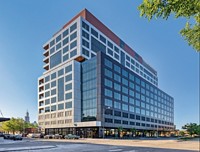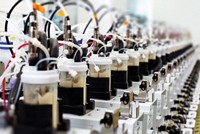Advertisement
Grab your lab coat. Let's get started
Welcome!
Welcome!
Create an account below to get 6 C&EN articles per month, receive newsletters and more - all free.
It seems this is your first time logging in online. Please enter the following information to continue.
As an ACS member you automatically get access to this site. All we need is few more details to create your reading experience.
Not you? Sign in with a different account.
Not you? Sign in with a different account.
ERROR 1
ERROR 1
ERROR 2
ERROR 2
ERROR 2
ERROR 2
ERROR 2
Password and Confirm password must match.
If you have an ACS member number, please enter it here so we can link this account to your membership. (optional)
ERROR 2
ACS values your privacy. By submitting your information, you are gaining access to C&EN and subscribing to our weekly newsletter. We use the information you provide to make your reading experience better, and we will never sell your data to third party members.
Start-ups
UC Berkeley gets new start-up hub
Facility for life science entrepreneurs can host up to 80 companies
by Melody M. Bomgardner
May 11, 2021

A start-up incubator focused on life science, engineering, and data science is coming to the University of California, Berkeley, this fall. The non-profit Bakar BioEnginuity Hub will stand out in the entrepreneurial Bay area, organizers say, for its size, affiliation with the university, and focus on innovations that benefit society.
The hub will be located in Berkeley’s former art museum. When renovations are complete, Bakar Labs will have 3,700 m2 of space for as many as 80 start-ups. Other programs will include fellowships and programming for Berkeley students and researchers, paid access to advanced facilities on campus, and connections to potential investors. Founders can get help from experts at the university’s business and law schools.
The incubator will also offer start-up founders the usual ability to connect with other entrepreneurs. “What’s different is scale,” Bakar Labs’ general manager Gino Segrè says. “Berkeley has an incredible number of scientific resources across campus that are available to start-ups.”
While founders do not have to be part of the university to apply for space in the lab, they do have to have a world-changing mission, Segrè says. The hub is looking for technologies that can fight climate change or improve human health, not another consumer product.
Berkeley has a tradition of launching successful start-ups, such as CRISPR-focused Caribou Biosciences and Zymergen, a biomanufacturing firm that recently raised $500 million in an initial public offering of stock.
Zymergen cofounder Zach Serber is a member of an advisory group for the Bakar hub. He says the focus on social good is what today’s market demands. “Incubators will start seeing an increasing number of innovators that want to build businesses with a conscience,” Serber says, noting that Zymergen is registered as a public benefit corporation. “I believe this is something we can—and should—help other developing businesses embrace.”
CORRECTION
This story was updated on May 11, 2021, to correctly state Zach Serber's connection to the Bakar hub. Serber is a member of an advisory group for the hub; he is not on its board.





Join the conversation
Contact the reporter
Submit a Letter to the Editor for publication
Engage with us on Twitter